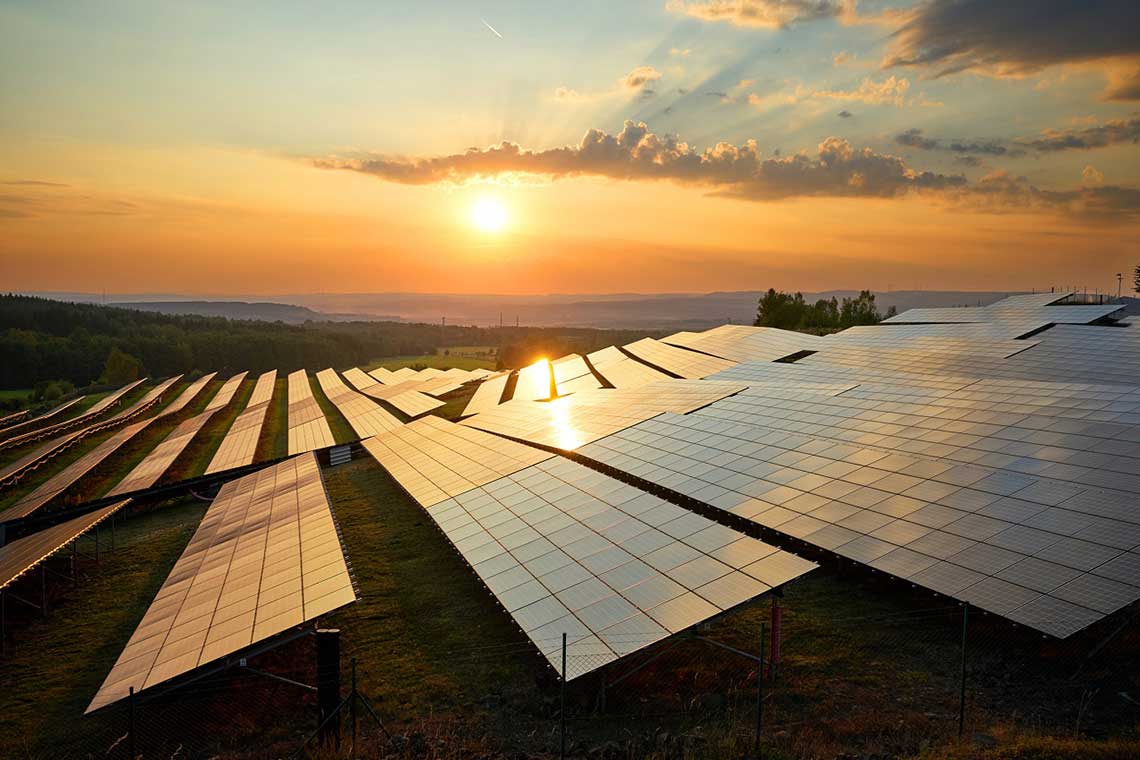
Image: Getty.
A collection of energy and environmental organisations are urging the government to up its commitment to UK solar with the implementation of a deployment target of at least 40GW by 2030.
The organisations – which include Community Energy England, E3G, the Green Finance Institute, WWF, Greenpeace and Possible – are recommending that the government develops a solar sector skills, financing and training deal to support the suggested deployment. This should be in line with government support for other renewables such as offshore wind, and includes detailed planning to develop the skilled supply chain that supports both solar and energy storage.
When it comes to utility scale solar, a capacity target of 5GW should be set and delivered annually through the Contracts for Difference (CfD) scheme, and a guarantee issued that solar will continue to be eligible.
For commercial rooftop, the government should class onsite generation and storage assets such as solar PV and batteries as ‘excepted plant and machinery’ under Class 1 in the business rates regulations, which would bring them into line with gas-fired CHP. Calls for changes to business rates have been made frequently recently, with a coalition of business associations demanding solar's exception from “punitive business rates” in October 2020. This followed the likes of supermarket chain Lidl seeing its business rates increase by 528% due to changes in the valuation of solar installations at its sites.
When it comes to residential rooftop, the organisations are recommending that the means-tested element of the Green Homes Grant scheme should be extended to make solar and energy storage eligible. This would allow low income households with no access to capital – including social housing tenants – the opportunity to use the full range of zero-carbon retrofitting options, the organisations said.
They continued to state that the implementation of the scheme also needs improving and extending for the rest of the Parliament. This follows several letters sent to both the Chancellor Rishi Sunak and Prime Minister Boris Johnson urging for reforms to the Green Homes Grant, including one organised by the Energy Efficiency Infrastructure Group that was also signed by E3G and WWF as well as one signed by 11 organisations including Greenpeace and Possible.
Other recommendations for residential rooftop include solar energy and storage technologies being zero-rated for VAT. This follows the VAT rate on home energy storage jumping from 5% to 20% in 2019, a move which has received heavy criticism from organisations such as the Committee on Climate Change and the MCS. In December 2020, the Association for Renewable Energy and Clean Technology (REA) penned an open letter, signed by over 30 industry groups, calling for the change to be reversed, and this month the Environmental Audit Committee recommended that VAT reductions should be brought in on green home upgrades in order to incentivise low-carbon installs.
The organisations went on to say that the government should also implement the recommendation of the Green Finance Institute for the new National Infrastructure Bank to provide capital support for 0% interest loans to homeowners to install green retrofits, including solar energy, zero carbon heating, insulation measures and energy storage.
Lastly, explicit support for community energy programmes should be provided. The organisations gave the example of the Netherlands, where a feed-in-tariff of 14.6c/kWh has been implemented. Community energy should be included in support for onshore renewables. They said the Urban Community Energy Fund should be reinstated alongside grants for local energy collaborations with Local Authorities.
Indeed, the organisations were quick to praise community energy, describing it as “hugely motivated and tenacious”, adding that with government support it is “ready to scale to deliver enough electricity to power 2.2 million homes, 8,700 jobs, save 2.5mtCO2 and add £1.8 billion to the economy by 2030, as well as secure the consent and involvement of people and communities”.
“Solar is one of the most affordable, efficient, and popular zero carbon electricity generation technologies available,” the organisations said, adding that the sector creates “high-quality environmental jobs and can help the UK deliver a green economic recovery from COVID-19”.
“As representatives of organisations working on energy and environmental issues, we call on the British government to commit to an ambitious target for the deployment of solar energy in the UK.”

